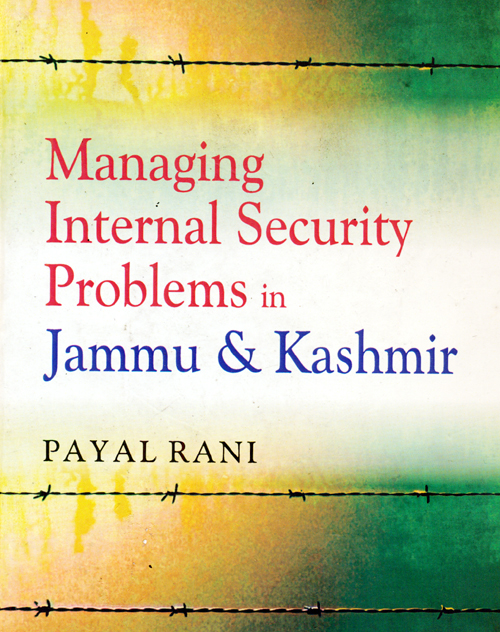O P Sharma
Name of book Managing Internal
Security Problems in Jammu & Kashmir
Author Payal Rani
Publisher Saksham Books
International, Jammu
Year 2015
Pages 219
Price Rs 795
The strategic and sensitive Jammu and Kashmir has many security related problems which have authoritatively been analyzed by a scholar Payal Rani in a detailed study.
The Book under review at first gives historical description of Jammu and Kashmir problem and subsequent events leading to security issues. The Pakistan since its inception in 1947 has been posing serious problems of security for the people of this border state by cross border terrorism and also instigating internal subversion by promoting fundamentalism and extremism.
Threat Perceptions
Kautilya in Arthashastra has pin pointed four types of threats: internal, external, externally aided internal and also internally aided external. She has emphasized that internal threats need immediate attentions, as they are even more serious than external threats. She rightly appoints that most serious enemy is the enemy within-a thought which is of great relevance even in the 21st century therefore, India has to be constantly vigilant against enemy within and outside. The jihadi terrorism sponsored by Pakistan is yet another serious internal security problem.
Jammu and Kashmir became part of India after Instrument of Accession was signed by the Maharaja Hari Singh on October 26, 1947 and since then Pakistan has been staking claim on Kashmir though legally, constitutionally and through the popular will of the people exercised through democratic elections radically over the past six decades. Pakistan has grabbed nearly one-third of Jammu and Kashmir territory illegally and fought four wars as also carried on proxy war but without much gain. As per Shimla Agreement, Lahore Declaration as also solemn pledge by Pakistan not to allow its territory for terrorist activities against India. But Pak rulers have scant regard for there own international commitments. Would the democratic regime in Pakistan shun the path of terrorism and turn for table talks with India for mutually tackling all the outstanding issues between the two nations.
Problems Pinpointed
The scholar has discussed all the possible angles of meeting the challenges posed by the threat perceptions aided and abetted from across the borders-Loc or even IB which are still kept alive by frequent ceasefire violations in order to push in terrorists to create internal subversion inside India, including J&K State.
It seems the Pakistan’s military rulers and the dreaded Inter Services Intelligences (ISI) must learn the lessons of history and earnestly work with India to iron out the differences for finding ways for establishing permanent peace by building bridges of confidence and better socio-cultural as well as trade-commercial ties for true friendship and cooperation.
Multi-Pronged Strategy
For effective management of internal security in the state, a four point strategy of counter infiltration, counter insurgency grid, countering anti India propaganda and winning the hearts and minds through operation sadhbhavana and other welfare measures has been yielding fruitful results to normalize the situation. Along with it close co-ordination between the security agencies of the Central and State Governments have resulted in bringing down the terrorist incidents. Timely and right intelligence inputs an action are able to put a check on the nefarious subversive elements. Three “D’s” are very important and these are Dialogue, Development and Democratization what PM Modi called Insaniyat, Kashmiriyat and Jammuriat along with development. The Unified Command became instrumental in coordinating the political and military efforts for bring normalcy in trouble torn Jammu and Kashmir.
Core Issues Highlighted
The 219-page book is a M.Phill research course was conducted by the author under the guidance of Dr. Mathew Joseph C., at the Jammu University. Presently, Ms Payal is doing PhD under the supervision of Dr Seema Rohmetra and her thesis is related to internal security management in Jammu and Kashmir.
A merit of Payal’s work is a detailed Bibliography of the source material relevant to the subject of internal security problems. An Appendix compressing of very important historical documents including Instrument of Accession, Article 370, and Sheikh Abdullah’s speech at constituent Assembly on October 31, 1951; The Delhi Agreement, 1952; the Shimla Agreement, 1972 and an Index has also been given. A redeeming feature is that in a separate chapter the conclusions of the entire study have been included.
The book has been published by Saksham Books International, Jammu. It is a quality production with fine printing on a good quality paper. It is, to my mind, a bit highly priced. However the book touches the most vital issues of public security and so it would be a much needed reading for the political leaders, security experts, academicians, administrators, legislators, members of civil society and even the common man to better understand the security scenario of Jammu and Kashmir for effective and efficient management.
(Starline Syndicate Service)


